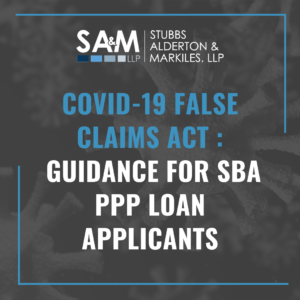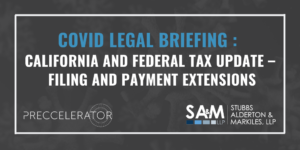 To assist small businesses in the wake of the COVID-19 pandemic, Congress established the Paycheck Protection Program (“PPP”) under the CARES Act, with $700 billion in Small Business Administration (“SBA”) loans to small businesses intended to pay for payroll, rent, and other expenses. To be eligible, a business is required to complete a short, 4-page PPP Borrower Application Form (“Application”). For many businesses in a rush for funds and eager to submit the Application before program funding was depleted, completing the Application could have been accomplished relatively quickly, with basic information about the business, signing the Application, and certifying, among other statements, that the “[c]urrent economic uncertainty makes this loan request necessary to support the ongoing operations of the Applicant.” After the launch of the PPP, the SBA has released a series of FAQs, which have provided additional clarity and, at times, additional confusion, regarding, among other issues, the question of “necessity”. As a result, each small business that received PPP funds must ask: What does “necessary” mean, and what if the PPP funds were not “necessary”?
To assist small businesses in the wake of the COVID-19 pandemic, Congress established the Paycheck Protection Program (“PPP”) under the CARES Act, with $700 billion in Small Business Administration (“SBA”) loans to small businesses intended to pay for payroll, rent, and other expenses. To be eligible, a business is required to complete a short, 4-page PPP Borrower Application Form (“Application”). For many businesses in a rush for funds and eager to submit the Application before program funding was depleted, completing the Application could have been accomplished relatively quickly, with basic information about the business, signing the Application, and certifying, among other statements, that the “[c]urrent economic uncertainty makes this loan request necessary to support the ongoing operations of the Applicant.” After the launch of the PPP, the SBA has released a series of FAQs, which have provided additional clarity and, at times, additional confusion, regarding, among other issues, the question of “necessity”. As a result, each small business that received PPP funds must ask: What does “necessary” mean, and what if the PPP funds were not “necessary”?
Addressing the Issue of “Necessity”
Those small businesses looking for a precise definition of “necessary”/”not necessary” may be looking for the foreseeable future because the federal government has not defined the meaning of “necessary”, though the SBA has provided some guidance in FAQs 31 and 37 (and has indicated in FAQ 43 that it intends to issue additional guidance on this question before May 14, 2020). We explore the question of necessity in greater detail in “SBA Guidelines Regarding Necessity.”
What if the PPP Funds Were Not “Necessary”? Potential Liability under The False Claims Act
Unfortunately for many small businesses and individual directors and officers, the answer to the second question (i.e., what if the PPP funds were not “necessary”?) is much clearer, and not for the better. Each business that received PPP funding (as well as those directors, officers, and/or employees who were involved in preparing and submitting the Application) could face liability under The False Claims Act (31 U.S.C. §§ 3729 – 3733), which is longstanding federal legislation that imposes liability upon any “person” (which includes any corporation, partnership, limited liability company, or any other entity, as well as any director, officer, employer, or independent contractor) who/that “knowingly” submits a materially false or fraudulent claim for payment to the federal government. A “person” acts “knowingly” under The False Claims Act when that person “has actual knowledge of the information”, “acts in deliberate ignorance of the truth or falsity of the information”, or “acts in reckless disregard of the truth or falsity of the information”.
Director/Officer Liability under The False Claims Act
This means that every director/officer who “knowingly” participated in preparing and submitting an Application that contained materially false or fraudulent information could face liability under The False Claims Act.
As a practical matter, to avoid liability under The False Claims Act, the director/officer would need to establish, at a bare minimum, that he/she acted reasonably and in good faith in assisting with the Application, and that he/she was not reasonably aware of any materially false or fraudulent information in the Application. Stated alternatively, liability could extend to those directors/officers who did not make (or chose not to make) a reasonable and prudent inquiry into the possibility that the Application contained materially false or fraudulent information.
Directors/officers could also face liability for relying on analysis/information from an expert or specialist (including an accountant) regarding the necessity of the PPP funds if the expert’s analysis/information turned out to be materially false or fraudulent. In such situations, directors/officers could face liability if they failed to either provide the expert with (or access to) the relevant documents and/or reasonably rely on the expert’s analysis.
Further, individual directors/officers (as well as businesses) should also note that The False Claims Act applies to “implied certifications”, which are statements that are rendered misleading or deceptive because they omit material information (commonly referred to as “half-truths”). This would include a business’s failure to disclose that it violated a regulation, statute, or law that would affect its eligibility to operate in good standing and/or receive PPP funds.
While the issue of individual director/officer liability is fact-specific and requires analysis of the specific circumstances, each person who was involved in the Application process must scrutinize the extent and nature of his/her involvement, and understand that “pointing the finger” is not a valid defense under The False Claims Act. In analyzing their prospective liability, those participating individual directors/officers should consider whether they sought to independently confirm the accuracy of the information in the Application; whether they had an opportunity to independently verify the materially false or fraudulent information; whether they appropriately supervised the Application process; and whether, with due diligence, they could have spotted the materially false or fraudulent information in the Application.
Lawsuits to Enforce The False Claims Act
To enforce The False Claims Act, the U.S. Department of Justice (“DOJ”) can file a lawsuit against any “person” in violation. Commonly in False Claims Act enforcement, lawsuits are filed by a “relator” – that is, any person, including an ordinary citizen or a whistleblower, who is the “first to file” a lawsuit and who has original evidence that the alleged violating business or individual director/officer violated The False Claims Act. Relator status is subject to specific filing and service procedures, as set forth in 31 U.S.C. § 3730. Further, after the relator files the lawsuit, the DOJ has the discretion to stand in the shoes of the relator to prosecute the lawsuit as the original plaintiff. Alternatively, if the DOJ chooses not to intervene, it can dismiss the lawsuit over the relator’s objection, or seek to stay discovery if the lawsuit would interfere with the federal government’s investigation or prosecution of a related criminal or civil matter.
Damages under The False Claims Act
If a court determines that a defendant business, director, officer, or other person violated The False Claims Act, then, pursuant to 31 U.S.C. §§ 3729 – 3730, each such defendant faces liability for 2 to 3 times the amount of damages that the federal government sustained (which would likely consist primarily of the amount of the loan, especially if forgiven), in addition to a civil penalty in an amount between $11,181 and $22,363 (as set forth in 28 C.F.R. § 85.5), the costs of litigation, and the relator’s reasonable attorneys’ fees and costs as the prevailing party (if applicable). This is in addition to potential criminal liability.
Take Immediate Action to Avoid or Reduce Potential Liability under The False Claims Act
For those businesses and individual directors/officers concerned with potential liability under The False Claims Act, it is critical that they act immediately. Businesses that repay the loan in full by May 14, 2020, “will be deemed by SBA to have made the required certification in good faith.” This means that, as long as the PPP funds are fully returned by May 14, the business and officers/directors will not face liability under The False Claims Act (or other civil or criminal liability arising from the act of submitting an Application that contained materially false or fraudulent information). Even if the PPP funds are not returned by May 14, the business and individual directors/officers should still take immediate efforts to return those funds that were not “necessary”— as the timing of repayment could constitute a mitigating factor that could potentially reduce damages and penalties if a False Claims Act lawsuit is filed.
Other Important Considerations for Businesses and Directors/Officers
Even for those businesses and directors/officers that have experience litigating corporate governance or related business disputes, an action under The False Claims Act is not your average lawsuit. For example, under the business judgment rule – which is a common defense in litigation by shareholders involving corporate governance and business disputes in Delaware and California corporations – directors and officers who act in their representative capacity are presumed to have acted in good faith and reasonably in most circumstances. Under The False Claims Act, however, the federal government – and not the shareholder or member – suffers the harm. As a result, the business judgment rule is unlikely to provide comfort to directors/officers in claims involving The False Claims Act.
Moreover, in analyzing potential liability or litigation under The False Claims Act, businesses and directors/officers should also look into potential insurance coverage under any applicable D&O, errors, and omissions, or related insurance policy/coverage. For these reasons, in addition to other issues that are unique to The False Claims Act, any business or individual concerned with potential liability or litigation should immediately consult with an attorney.
Looking to the Future
The federal government has made clear that it is committed to ensuring that only those eligible businesses received PPP funds. More specifically, in FAQ 39, the SBA explained: “To further ensure PPP loans are limited to eligible borrowers in need, the SBA has decided, in consultation with the Department of the Treasury, that it will review all loans in excess of $2 million, in addition to other loans as appropriate, following the lender’s submission of the borrower’s loan forgiveness application.” Further, as announced on April 20, 2020, the Senate Committee on Small Business and Entrepreneurship intends to “conduct aggressive oversight of the Paycheck Protection Program (PPP), including whether companies made false certifications to the federal government to receive PPP loans.” While the definition of “necessary” might not be certain, one thing is certain — there will be many False Claims Act proceedings linked to the PPP program, in the years to come.
COVID-19 Preccelerator Resource Center
https://preccelerator.com/category/covid-19-resources/
For further information and follow-up on this article, contact our business litigation chair Michael Sherman, or SA&M attorneys Caroline Cherkassky, Dan Rozansky or Neil Elan.


 The Internal Revenue Service and the California Franchise Tax Board have issued guidance allowing an extension of time to pay income taxes and file returns.
The Internal Revenue Service and the California Franchise Tax Board have issued guidance allowing an extension of time to pay income taxes and file returns.